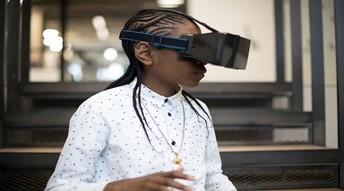Brian Thuer of West Chester, PA studied International Business at the College of Charleston, and received his master’s degree in Business Administration at West Chester University. In today’s world, no one is immune from technology. From young to old, technology impacts our daily life in a variety of ways, combining convenience, entertainment, communication and beyond. In the following article, Brian Thuer explains what the Metaverse is, how it is used in a variety of settings and why this is the technology of the future.
From tech development to experimentation to innovation, humans are the driving force behind unveiling the future. The world shifted from read-only Web 1.0 to the ongoing decentralized greatness of Web 3.0.
And yet, people still want more. The creation of the Metaverse is a testament to that explains Brian Thuer.
The blockchain-heavy network linking various virtual spaces to craft a never-experienced-before digital world is the Metaverse’s MO. It’s most certainly the future of digital connection, thanks to its seemingly limitless applications at home, in healthcare, and in business.
As more firms enter the sector, virtual reality (VR) and augmented reality (AR) allow Metaverse to realize its potential. Using glasses, handles, and headgear, users can enter the expansive digital world, experiencing an immersive environment with unbeatable security.
Brian Thuer says that such technology is already popular within the field. But experts predict the Metaverse has a place in nearly all industries — and even the home.
Metaverse at Home
Virtual, hybrid technologies utilized in the Metaverse can optimize a variety of home-based tasks. In fact, many households already boast advanced computers, head-mounted VR sets, and simulators, signifying the ever-growing usage of a digitized lifestyle.
In the future, people can expect to see at-home Metaverse through fiber and Wi-Fi, allowing residents to virtually connect to their personalized worlds says Brian Thuer.
The most significant application in homes, however, is enhanced remote working. Through this technology, meetings, projects, collaborations, and interactions feel much more like in-person conversations, eradicating the limits of webcams and screens.
Meta-Entertainment
Unsurprisingly, Brian Thuer says the industry moguls believe the entertainment industry will become one of the most profitable fields for the Metaverse to expand into. Everything from virtual concerts to sports events to social media groups to shows can be conducted within the digital world, thanks to AI and AR-VR gadgets.
Brian Thuer says that avatars within the online universe can buy and adorn their sports clubs’ official merch, enjoy the game with other fans, and more without ever leaving the comfort of their own home. Plus, with multi-view cameras, fans can get up close and personal with their favorite athletes.
eGaming
Naturally, online gaming has become the basis of Metaverse evolution.
Big-name firms in the industry are pouring buckets of funding into their research and development departments to explore the opportunities of this technology in the online gaming space explains Brian Thuer.
Blockchain guarantees money safety, allowing excellent risk mitigation and endless advanced marketing opportunities for businesses with the budget. From billboards to game content to merchandise worn by avatars, marketing within online gaming will never be the same again.
Metaverse in Healthcare
Currently, augmented reality is used to enhance medical students’ learning experiences, improving their confidence in utilizing assistive tools before heading to the operating table.
Vitals monitoring is set to become more manageable with Metaverse technology, allowing surgeons and nurses to view real-time data like heart rate, blood pressure, and breaths per minute.
Some researchers suggest AR can also help solve vein location problems. Not to mention the advancements in CT scans and X-rays, giving healthcare providers a virtual way to look inside patients and determine their concerns.
 Real Estate
Real Estate
Brian Thuer explains that virtual reality has been a huge steppingstone in the real estate world, allowing buyers from all over the world to look at properties. However, the Metaverse would deepen the immersion, taking the limitations of VR to new heights.
Interior stagers and realtors can integrate multimedia features (like ambient light and sound effects) into their tours to aid selling and reduce the time houses sit stagnant on the market.
Ultimately, the sector stands to save a lot of time and money with the Multiverse. Clients can get a feel of the house wherever they are, perusing all the defects and gaining assurance of the criteria before purchasing.
Conceivably, higher property values may be found in desirable locations such as metaverse concert venues. Here, the property never becomes tangible, but the investment can be like purchasing a real land deed as is done in the traditional process, and it’s in place for hundreds of years.
Business
The technologies are changing the way businesses conduct sales, marketing, and their overall operations at rates few predicted explains Brian Thuer.
The potential for the Metaverse in business is unimaginable, ranging from enhanced social media experiences to optimized productivity through hologram-based communication.
Virtual billboards on digital highways present exciting new channels for advertisers and marketers to let their creativity run wild. All of which will be seen by millions of people every day.
It may sound like something straight out of a sci-fi novel, but it’s already the reality.
The Bottom Line: The Future is Meta
Since Metaverse is still in its infancy, it’s relatively early to accurately predict how it will expand. But equally, experts suggest these technologies are progressing faster than possible, so the world is sure to experience these exciting applications soon enough.








